Many people take krill oil because its an excellent source for omega-3 fatty acids and krill oil is a popular alternative to fish oil for people who are worried about mercury and PCB contamination.
Krill oil is absorbed better than fish oil, and carries a potent antioxidant you won’t find in other sources of omega 3s.
Krill is also a more sustainable and potentially more ethical source for omega-3 fatty acids, though some of this depends on the particulars of how the oils are harvested.
The benefits of krill oil hinge in large part on choosing a high quality krill oil supplement, so it’s imperative that you choose a good one.
Our research team has separated the wheat from the chaff with our rankings of the best krill oil.
Our advisory panel and our research team rank the best health products and supplements based on performance, label accuracy, and the efficacy of the ingredients in the products.
- Best overall: 1MD Antarctic Krill Oil
- Best for cognitive function: Transparent Labs Krill Oil
- Best for athletes: Antarctic Krill Oil
- Neptune Krill Oil
- Best for heart health: Viva Naturals Krill Oil
Research
Rankings
Last updated: November 1, 2022
Krill oils considered: 23
Hours of research: 40
Experts reviewed: 6
Scientific papers referenced: 14
| IMAGE | PRODUCT | |
|---|---|---|
Best Overall 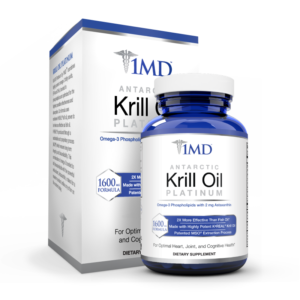 | 1. 1MD Antarctic Krill Oil
| View Latest Price → |
Best for cognitive function 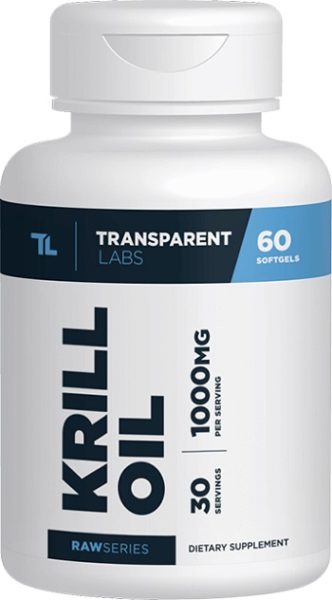 | 2. Transparent Labs Krill Oil
| View Latest Price → |
Best for athletes 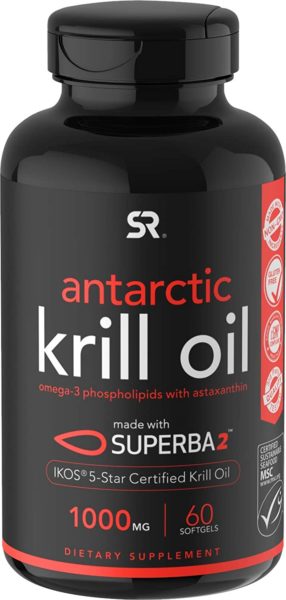 | 3. Antarctic Krill Oil
| View on Amazon → |
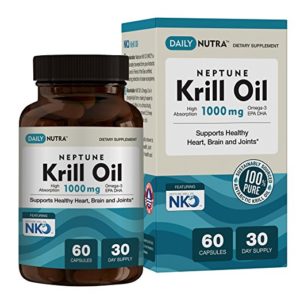 | 4. Neptune Krill Oil
| View on Amazon → |
Best for heart health 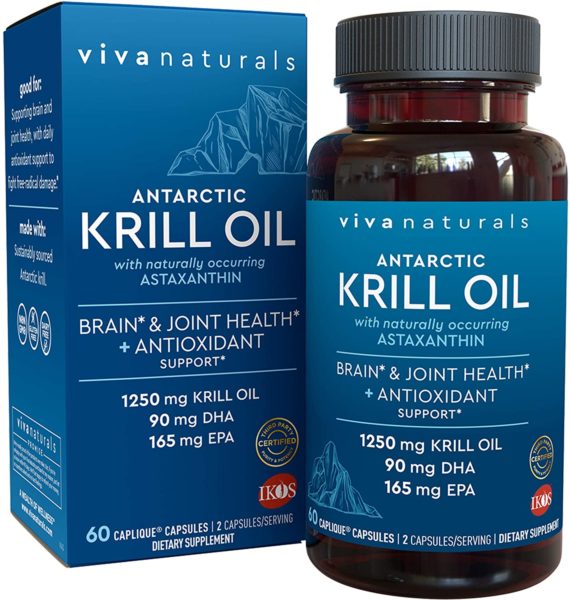 | 5. Viva Naturals Krill Oil
| View on Amazon → |
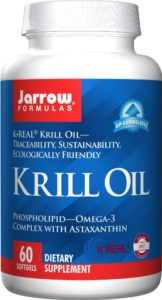 | 6. Jarrow Formulas Krill Oil
| View on Amazon → |
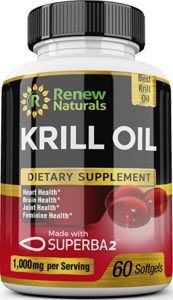 | 7. Renew Naturals Antarctic Krill Oil
| View on Amazon → |
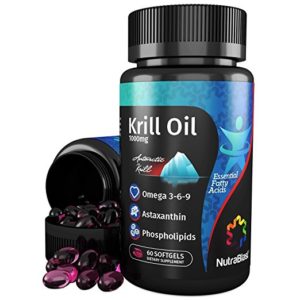 | 8. NutraBlast Krill Oil
| View on Amazon → |
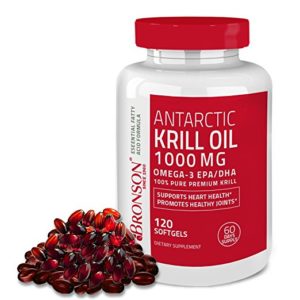 | 9. Bronson Antarctic Krill Oil
| View on Amazon → |
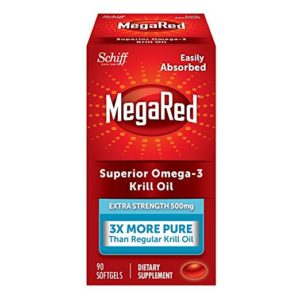 | 10. Schiff MegaRed
| View on Amazon → |
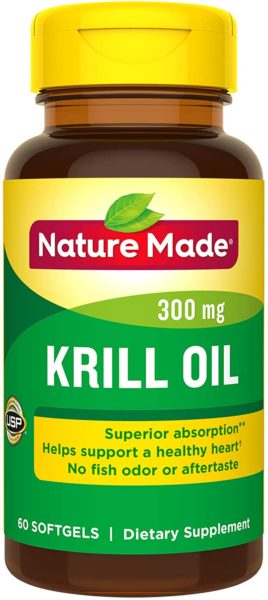 | 11. Nature Made Krill Oil
| View on Amazon → |
1. 1MD Antarctic Krill Oil

Click here for the lowest price
1MD Antarctic Krill Oil was simply the best krill oil we tested.
People are taking this every day because it’s the most effective krill oil for helping joint pain.
Each serving is loaded with 1600 mg of pure krill oil. It also has more astaxanthin – a powerful antioxidant that helps boost overall health and energy levels – than any other krill oil we reviewed on this list.
“1MD Krill Oil Platinum contains 100% natural ingredients, absolutely no artificial fillers or synthetic additives, and is clinically proven to be effective…1MD has formulated the purest, most high-quality krill oil on the market today”, says board certified cardiologist Michael Finster, MD.
Simply the best option for those serious about eliminating joint pain.
Click here for the lowest price
2. Transparent Labs Krill Oil

Click here for the lowest price
Transparent Labs makes a potent krill oil loaded with 1,000 mg krill oil per serving. Contained within each gel capsule is 120 mg EPA and 55 mg DHA encapsulated in highly bioavailable phospholipids.
The exact krill oil that Transparent Labs uses is Superba krill. They choose this source as it is ultra-pure and sustainably harvested from the ice-cold waters of Antarctica.
In addition to phospholipid enhanced EPA and DHA, Transparent Labs Krill Oil also contains 80 mcg of astaxanthin. Unlike other brands, the astaxanthin found here is completely naturally occurring and enhanced by phospholipids, not artificially added.
Transparent Labs provides nutrient-rich krill superior to other brands on a gram-per-gram basis, sustainably sourced for your peace of mind.
3. Sports Research Antarctic Krill Oil

With 1000 mg of highly pure krill oil per serving, Antarctic Krill Oil provides a high overall dose of the oil. This dosage breaks down into 400 mg of phospholipids, 128 mg of EPA, and 60 mg of DHA.
Additional antioxidant benefits come from the 1 mg of astaxanthin per serving, which is decent for a krill oil supplement, although our #1 recommendation is double that (2 mg).
5. Viva Naturals Krill Oil

Viva Naturals offers a krill oil supplement in a high dosage that provides a good portion of EPA and DHA–there are 1250 mg of total krill oil per serving and 165 and 95 mg of EPA and DHA, respectively.
The only downside is that the serving size is actually two softgels instead of one, so if you are only taking one capsule, you need to divide all these numbers by two.
4. Neptune Krill Oil

Two things distinguish this krill oil supplement. The first is the very high dosage per capsule: 1000 mg of total krill oil. The EPA, DHA, and astaxanthin contents are solid as well.
Neptune is also the company that has funded much of the scientific research into krill oil, so many of the studies supporting its health benefits use this exact supplement. If you want to be sure that you are following the scientific research protocols as closely as possible, Neptune Krill Oil is the way to go.
6. Jarrow Formulas Krill Oil

Jarrow Formulas delivers 1200 mg of krill oil, divided up into two capsules per serving (so only 600 mg per capsule).
This product does not contain as much astaxanthin as some other competitors; there are only 0.11 mg per serving, so if this is an important component for you when it comes to krill oil, there might be better options.
7. Micro Ingredients Krill Oil
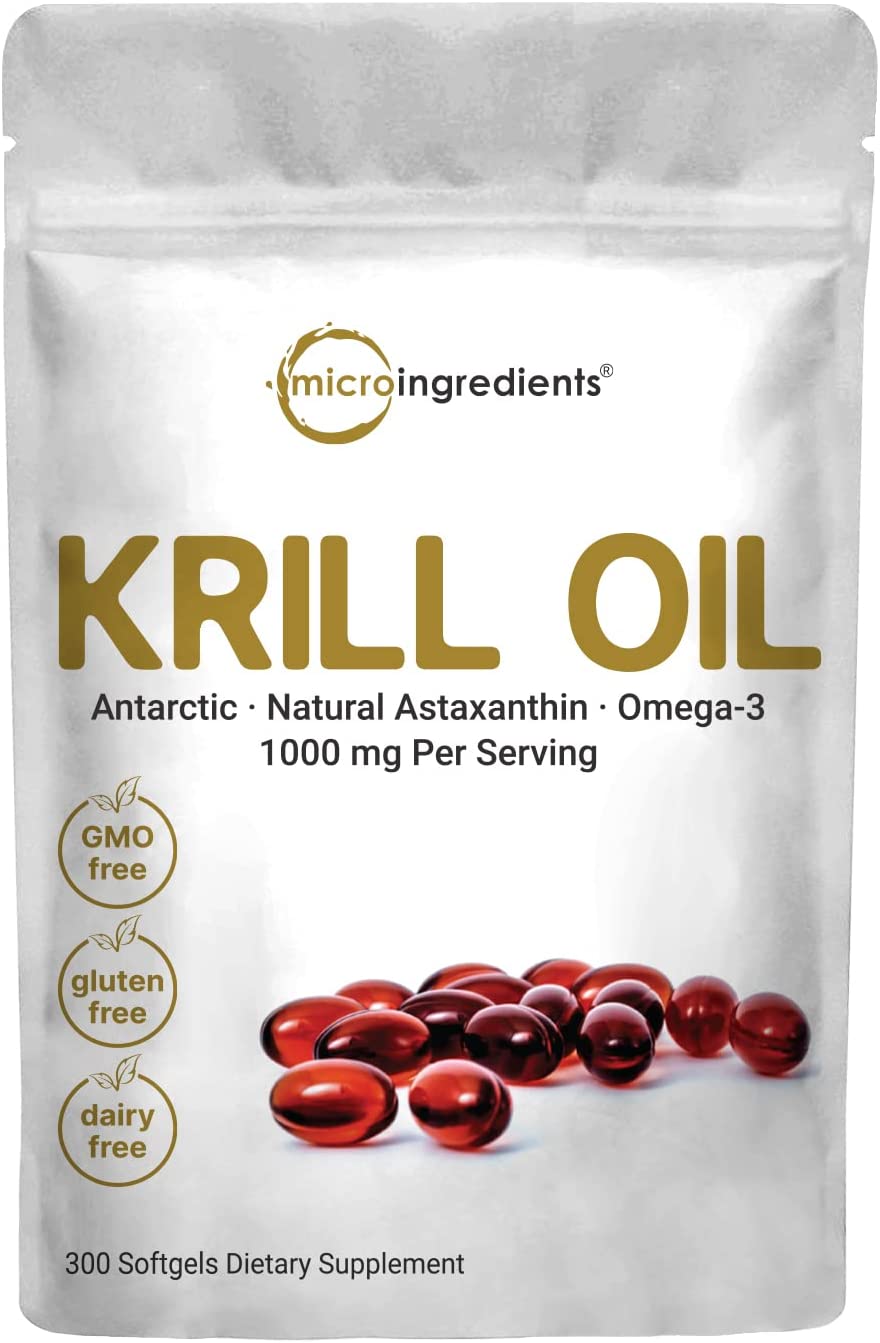
Micro Ingredients Krill Oil has a potent dosage of phospholipids and astaxanthin, and its capule design is super simple.
The only downside is the packaging – the resealable plastic bag is not as well-suited for protecting the capsules from oxygen. That disadvantage aside, it’s a solid product.
8. Bronson Antarctic Krill Oil
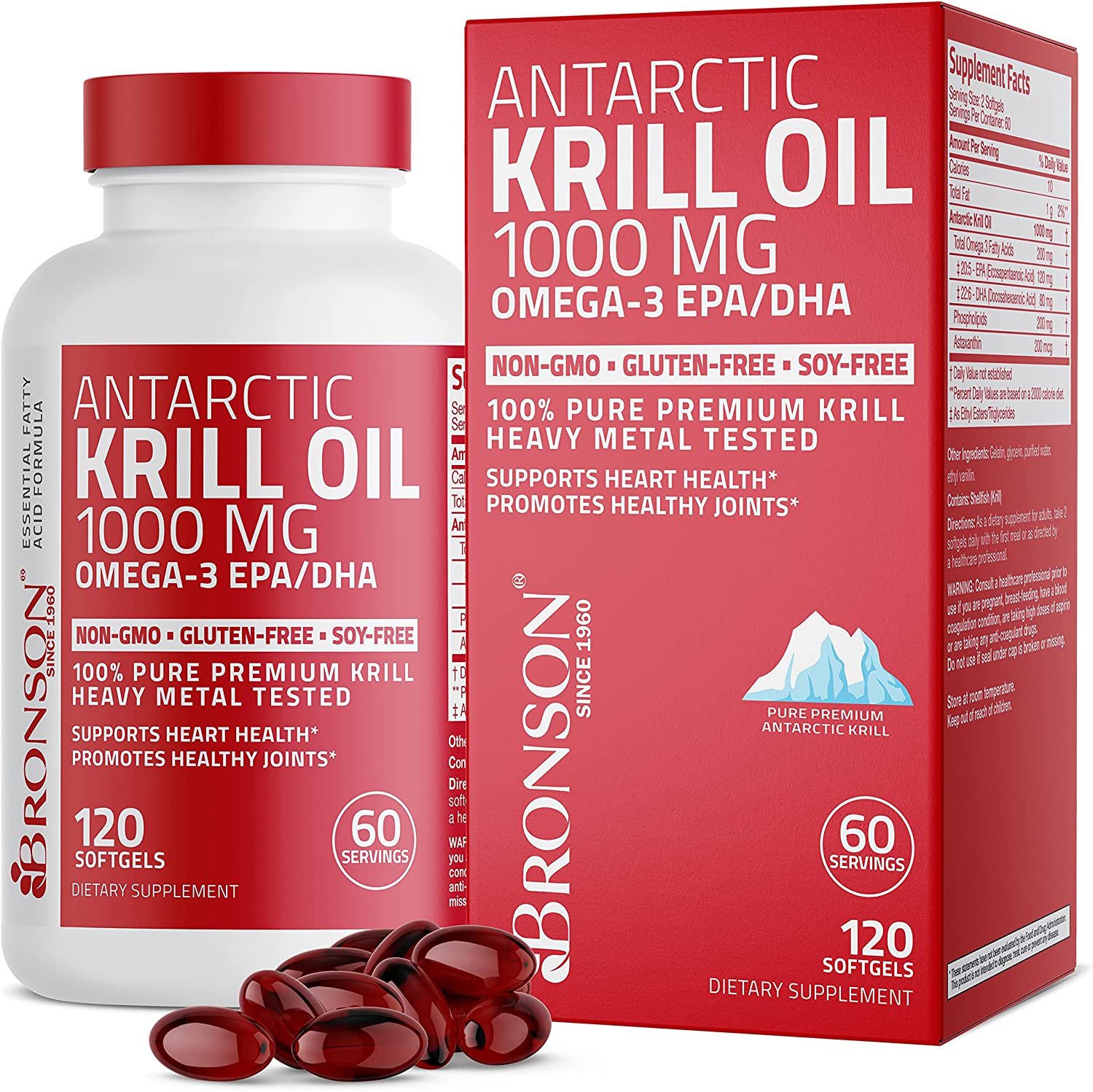
Bronson Antarctic Krill Oil is another pretty standard take on krill oil: 500 mg of krill oil per capsule, and a moderate amount of DHA, EPA, and astaxanthin.
Still, other competitors beat it out in each of these categories.
9. Schiff MegaRed

While it’s very popular and it does have a high EPA and DHA content relative to its krill oil content, there’s no getting around the fact that MegaRed has a fairly low overall krill oil content per serving.
Each capsule only contains 350 mg of krill oil, and the astaxanthin content is quite small, at only 17 micrograms.
10. Nature’s Bounty Krill Oil
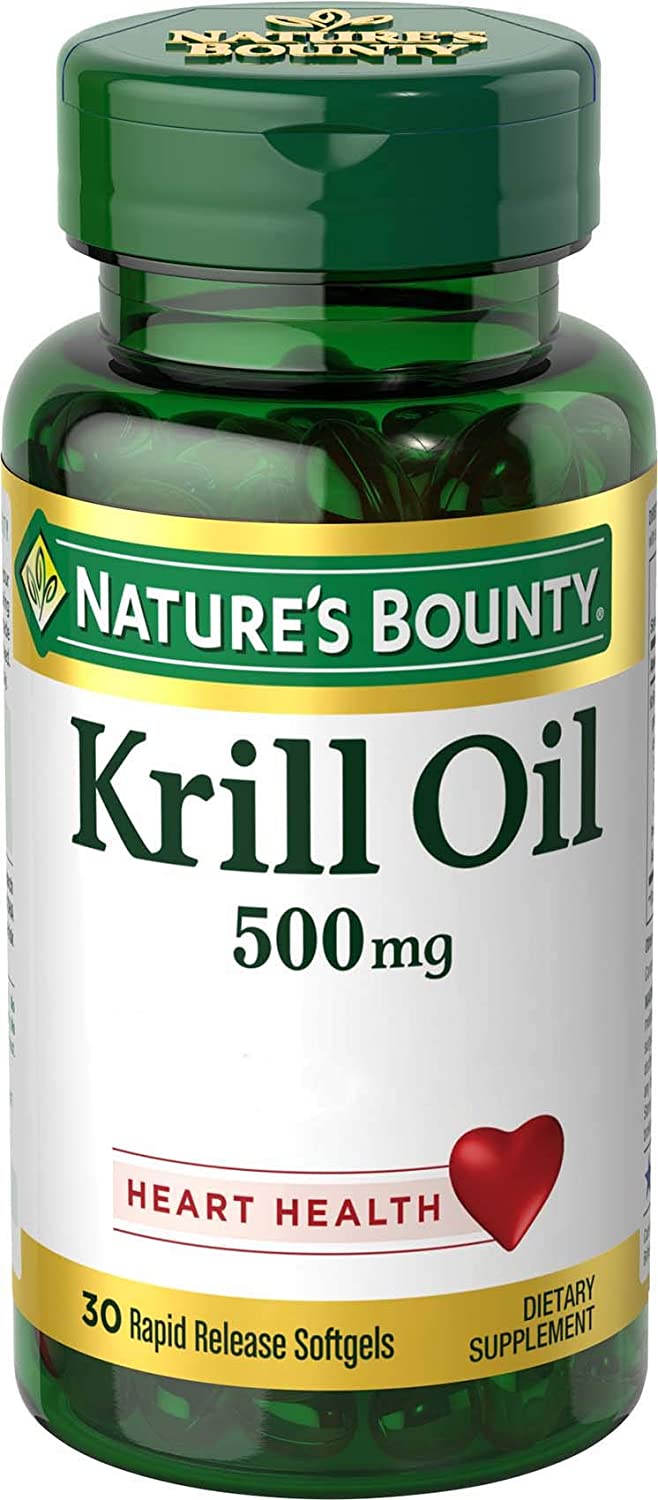
Though Nature’s Bounty is a big brand and its products are ubiquitous, their krill oil supplement leaves a bit to be desired.
Each capsule has 500 mg of krill oil, which is not bad, but is pretty weak when it comes to EPA and DHA content. It also doesn’t measure up to its competitors when it comes to phospholipids and astaxanthin.
Category winners
Best krill oil overall: 1MD Antarctic Krill Oil
1MD Antarctic Krill Oil wins out overall thanks to its incredible potency, both with regards to omega 3 fatty acids and the powerful antioxidant astaxanthin. For both long-term health and more immediate concerns like joint pain, 1MD is a great first pick.
Best krill oil for heart health: Viva Naturals Krill Oil
For heart health, it’s all about EPA and DHA. Viva Naturals Krill Oil offers high concentrations of both of these critical omega-3 fatty acids, making it the best krill oil if you want to improve your cardiovascular health.
Best krill oil for cognitive function: Transparent Labs Krill Oil
Transparent Labs Krill Oil is ultra-pure and ultra-simple. It’s best for cognitive health both because of its potency (a formidable 1000 mg of krill oil per serving) and its lack of unnecessary additives makes it an excellent pick for enhancing or preserving cognitive function.
Best krill oil for athletes: Sports Research Antarctic Krill Oil
Sports Research balances solid doses of the primary omega 3 fatty acids (DHA and EPA) alongside a respectable amount of phospholipids. Athletes will benefit from both when it comes to recovery and decreasing post-workout soreness.
Best krill oil for joints: 1MD Antarctic Krill Oil
When it comes to treating joint pain, it’s all about anti-inflammatory power. 1MD combines high doses of omega 3 fatty acids (which have strong anti-inflammation effects on their own) with astaxanthin, another potent antioxidant. It’s the best option out there if you want to use krill oil for joint pain.
Best krill oil for mental health: Viva Naturals Krill Oil
Viva Naturals has one of the highest doses of raw krill oil among our top picks, making it an excellent candidate for boosting your mental wellness. While the research on using krill oil and other sources of omega 3 fatty acids for depression, anxiety, and other mental wellness issues is still in its infancy, it suggests that higher doses may be beneficial.
Who should buy krill oil?
Krill oil is a great supplement for people looking to improve their health on multiple fronts. These include:
People who want better heart health. The omega-3 fatty acids in krill oil may contribute to reducing your risk factors for heart disease, thanks to the EPA and DHA content, which have been shown to have heart health promoting effects in scientific research.
People who want to sustain cognitive function as they get older. Astaxanthin, one of the key components in krill oil, is a potent antioxidant that could help augment the well-known cognitive benefits from omega-3 fatty acids for older adults.
People with inflammation-related joint pain. Many people find that the added antioxidant power of krill oil proves useful for combating stiff, painful joints caused by arthritis. As with krill oil’s potential cognitive benefits, the antioxidant power of astaxanthin is augmented by the antioxidant capabilities in the EPA and DHA found in krill oil’s omega 3 fatty acids
How we ranked
To evaluate the range of krill oil products on the market, we took a close look at their levels of three key bioactive compounds.
High omega 3 content, especially DHA and EPA. First and most important was the omega 3 fatty acid content, which can be measured directly by the levels of DHA and EPA.
These are two specific kinds of omega-3 fatty acids that have been directly connected through strong experimental research to better cardiovascular health. As such, we put a heavy weight in our rankings on the levels of EPA and DHA.
Some krill oil supplements didn’t specify a level of EPA or DHA, which is usually a trick to obscure low concentrations of these ingredients (it’s possible to get low-quality krill oil whose concentration of EPA and DHA is not very high; in contrast, better supplements use krill oil with a high concentration of EPA and DHA).
We dropped any krill oil supplement from our list that did not specify the breakdown of its omega-3 fatty acids. Then, we prioritized supplements according to their levels of DHA and EPA content.
Potent delivery of phospholipids. The omega-3 fatty acid content wasn’t the only ingredient we looked at, however. One of the points of distinction between krill oil and fish oil is that krill oil contains phospholipids, which may help boost the body’s ability to absorb the omega-3 fatty acids.
As we discuss later, some research has found equivalent effects between krill oil and fish oil, even when krill oil has substantially less omega-3 fatty acids.
As such, we made phospholipid content an important (though secondary) factor in our rankings. All else equal, we prefered krill oil supplements with a greater phospholipid content.
Strong antioxidant power from astaxanthin. Lastly, we tracked the levels of astaxanthin in the remaining supplements and used it as a marker of the supplement’s added antioxidant power.
Astaxanthin is what gives krill oil its distinctive deep red color. Like other deeply colored natural compounds such as coffee or resveratrol, astaxanthin has powerful antioxidant properties.
These properties give krill oil a leg up against other sources of omega-3 fatty acids, so again, all else equal, we preferred krill oil products that had greater astaxanthin levels.
After sifting out products that were weak in each of these three categories, plus applying our usual criteria of clean supplement design and no added fillers, we had our final rankings.
FAQ
Q: Is krill oil better than fish oil?
A: There are advantages and disadvantages to both krill oil and fish oil. Both contain omega-3 fatty acids, but fish oil tends to have a higher concentration, per milliliter of oil, of the vital fatty acids EPA and DHA, which are thought to account for many of the health benefits of any source of omega-3.
Fish oil has also been studied more deeply by scientific researchers, so if you wanted to weigh up the evidence for each fish oil would definitely come out on top.
On the other hand, krill oil has two ingredients you won’t find in high concentrations in fish oil. These are phospholipids and astaxanthin.
Phospholipids are fatty molecules that form the barriers around cell walls, and some researchers think that phospholipids could help increase the absorption of omega-3 fatty acids in krill oil.
Moreover, astaxanthin is a potent antioxidant that naturally occurs in krill oil (and is why krill oil has a deep red color, while fish oil is a pale golden color). These antioxidant benefits might help with combating inflammation and oxidative damage, though in studies that have compared fish oil and krill oil head to head, krill oil has not come out as distinctively better.
Q: What is krill oil made from?
A: Krill oil is made from krill, which are small, hard-shelled crustaceans that are found in huge quantities in the ocean. Krill (the organism) serve as the primary food for whales.
Krill is also harvested by fishermen for uses ranging from livestock feed to fish bait. Some portion of the krill harvested every year is processed so that the fatty oils inside the krill are extracted and purified, much like fish oil is extracted and purified from anchovies, sardines, or other types of fish.
Q: Does krill oil have benefits for skin?
A: Since krill oil is a source of omega-3 fatty acids, it should have all of the associated benefits of omega-3 fatty acids for your skin.
Perhaps thanks to the anti-inflammatory effects, omega-3 fatty acids have been used successfully in medical research to reduce the severity of psoriasis (1).
On top of that, because the DHA and EPA in any source of omega-3 fatty acid work their way directly into your bloodstream, the content of fatty acids in your skin cells actually increases if you take an omega-3 supplement for long enough.
One study found an increase in EPA levels within the epidermal cells of the skin after eight weeks of supplemental omega-3 fatty acid (2).
Q: What is the best time to take krill oil?
A: Because the DHA and EPA in krill oil last so long in your body, the time of day that you take krill oil is not particularly critical.
As long as you take it at approximately the same time every day, and are careful to not miss any of your doses day to day, taking it in the morning versus the evening does not matter.
With regular fish oil, some evidence suggests that taking at the same time as a high fat meal may increase the bioavailability of the fish oil.
While this is not a bad idea with krill oil, it may not be as necessary. The phospholipids that are contained in krill oil are thought to increase the bioavailability of the DHA and EPA, which may supplant or reduce the need for consuming fat alongside an omega-3 fatty acid source.
Q: How long does it take for krill oil to work in the body?
A: Most studies on the benefits of krill oil are a minimum of six to eight weeks long, so this is a good baseline for how long it should take for you to start seeing effects.
It takes several days from when you start taking krill oil until you reach a steady-state equilibrium of omega-3 fatty acids in your body, so you may start feeling some short-term effects more rapidly.
But most of the markers of long-term health that are beneficially affected by omega-3 fatty acids are slow to change, so improvements that you see in blood lipid levels, cognitive function, and mental wellness may take several weeks to appear.
Related articles
Recap
Krill oil is an extremely promising and very safe supplement for delivering omega 3 fatty acids to your body, fighting inflammation, and possibly for preventing premenstrual syndrome as well.
While it’s still unclear whether krill oil is superior in all regards to fish oil, it does seem to have additional benefits.
Because it is so new, there is still a need for independent research into the long-term benefits of taking krill oil, but if you want the benefits of fish oil plus additional joint pain or premenstrual syndrome-fighting effects, krill oil is an excellent addition to your supplement regimen.
For BodyNutrition‘s #1 krill oil recommendation, click here.